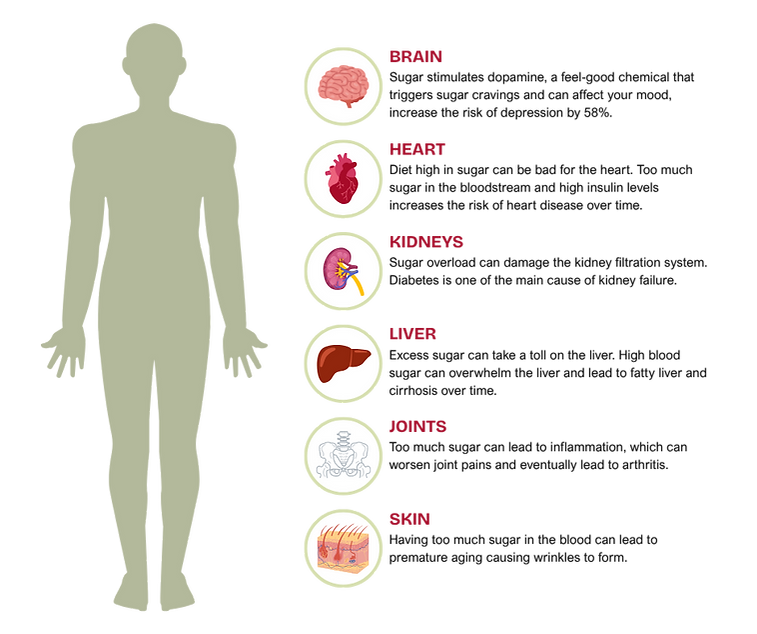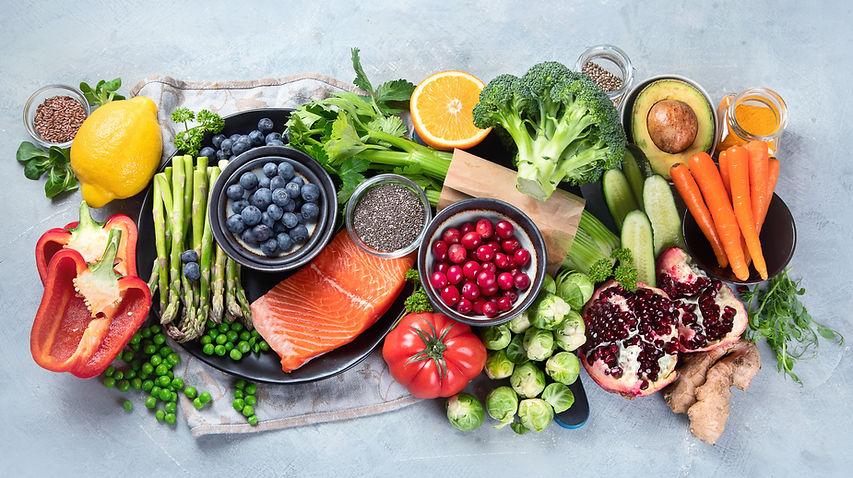

66 DAYS
SUGAR FREE CHALLENGE

Welcome to the 66-Days Sugar-Free Diet Challenge!
We’re excited that you’re here — because that means you're ready to take a powerful step toward better health, clearer focus, and lasting energy. Over the next two months, you’ll be part of a supportive, guided journey designed to help you eliminate added sugars and build healthier, sustainable eating habits.
Let's delve deeper into understanding how sugar impacts our bodies.
Health Impact of Sugar

Excessive sugar intake can contribute to inflammation in the body. Specifically, refined and added sugars are linked to increased levels of inflammatory chemicals in the blood. This inflammation can contribute to the development of chronic diseases like type 2 diabetes, heart disease, and arthritis.
Here is a more detailed explanation of how sugar does this.
-
Elevated Blood Sugar: When you consume a lot of sugar, your blood sugar levels spike rapidly, according to a blog post from Continental Hospitals. This triggers the release of insulin, which helps cells absorb sugar, but frequent spikes can lead to insulin resistance.
-
Insulin Resistance: With insulin resistance, your body's cells become less responsive to insulin, causing sugar to stay in the bloodstream longer. This can trigger an inflammatory response.
-
AGEs Formation: Sugar can also react with proteins and fats in your body to form Advanced Glycation End Products (AGEs). AGEs contribute to oxidative stress and inflammation.
-
Microbiome Disruption: Sugar can disrupt the balance of bacteria in your gut, potentially favouring the growth of pro-inflammatory bacteria, says Embracing Nutrition.
-
Pro-inflammatory Cytokines: High sugar intake can lead to the release of pro-inflammatory cytokines, which are molecules that signal the immune system to respond with inflammation.
So what are the consequences of Sugar-Induced Inflammation:
Chronic Disease
Chronic Inflammation is a risk factor for various diseases, including:
Type 2 diabetes
Heart disease
Arthritis
Alzheimer's disease
Certain types of cancer
Other Health Issues
Inflammation can also contribute to:
Weight gain and obesity
Joint pain
Teeth cavities
Increased risk of infections
Skin problems
It's important to note:
-
The inflammation caused by sugar is typically chronic, meaning it's a long-term, low-grade inflammation, not the kind you get with a cut or injury. This is great, it gives us a chance to make lifestyle and dietary changes.
-
While cutting out sugar completely isn't always necessary, reducing your intake, especially of refined and added sugars, can be beneficial for managing inflammation. Why refined sugars? Sugar, such as table sugar and high-fructose corn syrup—are rapidly absorbed into the bloodstream, causing spikes in blood glucose and insulin levels. These fluctuations can lead to energy crashes, increased hunger, and long-term metabolic problems.
-
Focus on a balanced diet with plenty of fruits, vegetables, and whole grains, which can help reduce inflammation, according to University of California - Davis Health. Natural sugars found in whole fruits, vegetables, and dairy are accompanied by fibre, water, and nutrients that slow digestion and moderate blood sugar response. This makes natural sugars generally safer and more beneficial for health.
While both types of sugar contribute to overall sugar intake, the context in which they are consumed—whole foods versus processed products—plays a crucial role in their impact on the body.

How did Sugar become
an integral part of our lives?
Sugar has a long and fascinating history that spans thousands of years and multiple continents. Its origins trace back to ancient India, where sugarcane was first domesticated around 8,000 BCE. Early Indians discovered how to extract juice from the cane and eventually learned to crystallize it, creating the first forms of sugar. The knowledge of sugar production spread to Persia and then to the Islamic world, where it was refined and traded extensively. By the Middle Ages, sugar had reached Europe through the Crusades and Arab trade routes, but it remained a luxury item reserved for the wealthy.
The Age of Exploration in the 15th and 16th centuries marked a turning point in sugar’s history. European powers established sugar plantations in the Caribbean, South America, and later in the American South, relying heavily on enslaved African labour. This dark chapter in sugar’s history fuelled the transatlantic slave trade and had profound social and economic consequences. By the 18th century, sugar had become a staple in European diets, leading to the rise of tea, coffee, and chocolate consumption.

In the modern era, sugar is produced on a massive scale from both sugarcane and sugar beets. It plays a central role in global cuisine and industry, though its health impacts have sparked growing concern. From a rare luxury to a ubiquitous commodity, sugar’s journey reflects broader themes of globalisation, industrialisation, and human cost.

Join Our FREE 66-Days
Sugar-Free Diet Challenge!
Reset Your Health, Reclaim Your Energy, and Say Goodbye to Sugar Cravings
Are you ready to break up with added sugar and experience the difference in your energy, mood, skin, and overall health?
This isn’t your average diet fad. Our Sugar-Free Challenge is a focused, guided 66-day journey that helps you cut out added sugars — the kind found in sodas, sweets, processed snacks, and even so-called “healthy” cereals and sauces — while embracing whole, nourishing foods that fuel your body.
Why Go Sugar-Free?
-
Steady Energy – No more sugar crashes. Experience all-day vitality.
-
Better Focus & Mood – Feel mentally clearer, calmer, and more emotionally balanced.
-
Healthier Skin – Reduce inflammation and get that glow back.
-
Weight Management – Naturally curb cravings and reduce calorie intake without starving yourself.
-
Disease Prevention – Lower your risk of diabetes, heart disease, and fatty liver disease.
-
Stronger Discipline – Break free from sugar dependence and feel in control again.
What You’ll Be Cutting Out?
You’ll eliminate added sugars – the sneaky ones hiding in your packaged foods, sweeteners, soft drinks, sauces, and desserts. This includes sugars in the form of sucrose, glucose syrup, high-fructose corn syrup, honey, syrups, and fruit juices.
Naturally occurring sugars from fruits and whole foods are allowed — we’re here to nourish, not restrict!
Who Should Join?
This challenge is perfect for individuals who:
-
Are motivated and resilient to improve their health
-
Struggle with sugar cravings or emotional eating
-
Want to lose weight naturally
-
Experience energy dips or brain fog
-
Have a history of high sugar intake and want a reset
-
Are committed to learning and experimenting with clean, whole-food meals
Who Should Consult Before Joining?
If you have medical conditions such as diabetes (Type 1 or Type 2), a history of eating disorders, are pregnant or breastfeeding, or are on specific medications —
We highly recommend you speak with your doctor.
What to Expect?
Results and symptoms will vary from individual to individual.
Week 1 - 2
Expect sugar withdrawal symptoms like headaches or cravings — but don’t worry, we’ll guide you through it with support and tips.
Week 3 - 4
More energy, fewer cravings, better sleep, and clearer skin.
Week 5 - 9
Stronger willpower, stable moods, and long-term habits forming.
